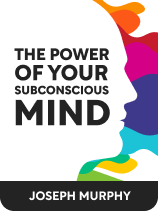

This article is an excerpt from the Shortform book guide to "The Power of Your Subconscious Mind" by Joseph Murphy. Shortform has the world's best summaries and analyses of books you should be reading.
Like this article? Sign up for a free trial here .
How does your subconscious mind think? Is it possible to program your subconscious mind to think in a more goal-oriented way?
Your subconscious mind doesn’t think in concrete terms like your conscious mind does. Therefore, to influence your subconscious mind, you need to speak its language—feelings and imagery. Instead of thinking about how you’ll achieve something, focus on the end results and imagine the gratitude you’ll feel once you have it. This process will set a clear direction for your subconscious mind to move towards.
Keep reading to learn how to program your subconscious mind—the key is to focus on the end result.
Focus on the End Result
In his book The Power of Your Subconscious Mind, author Joseph Murphy explains how to program your subconscious mind for success. The key, he says, is to focus on what you want to achieve, not how you are going to get there.
(Shortform note: Like Murphy, Wattles (The Science of Getting Rich), argues that you shouldn’t worry about how to achieve what you want. Instead, just expect everything to work out in your favor. Wattles suggests that imagining your desired end result and practicing gratitude in advance of receiving what you want not only sends a clear message to the universe, but it also keeps you from becoming dissatisfied with your current life experiences. This is because, when you imagine feeling grateful for something you don’t yet have, you feel positive regardless of what’s actually happening in your life. The more positive you feel, the more likely you are to adopt behaviors that move you closer to what you want.)
Murphy suggests that you use this method to improve your thinking about any area of your life:
Addictions
Imagine the freedom you’ll feel and all of the opportunities you’ll embrace once you’re free from your addiction. According to Murphy, the more you focus on the benefits of releasing your addiction, the less likely you’ll be to give in to your urges.
(Shortform note: According to James Clear (Atomic Habits), as well as focusing on the outcome of what you want (how good you’ll feel to be free from your addiction), you also need to define the beliefs that will support your disassociation from this bad habit. This is because your habits are inextricably linked to what you believe about yourself. Your beliefs about who you are encourage your habits and your habits encourage what you believe about yourself: for example, “I smoke, therefore, I believe that I need cigarettes to be happy.” So, in addition to imagining how you’ll feel, consider replacing your current beliefs with healthier ones that support the changes you seek to make: for example, “I am healthy and enjoy taking care of my body.”)
Love
Focus on your partner’s best qualities and take the time to offer praise. If you’re looking for a partner, Murphy suggests that you think about what type of person you want to be with, how you’ll spend your time together, and how this person will make you feel.
(Shortform note: According to psychologists, your internal dialogue determines your ability to focus on the positive aspects of your relationships and reflects in the way you interact with others. When your internal dialogue is positive, you’re more likely to practice self-compassion, have an awareness of your best qualities, and accept yourself as you are. Because you see the best in yourself, you’re able to recognize the unique strengths and values in others. On the other hand, when your internal dialogue is negative, you’re more likely to engage in self-critical dialogue that focuses more on what you dislike about yourself and where you’re going wrong. Because you’re unable to recognize your own value, you’re less able to see the value in others.)
Problems
Trust that every problem comes with a solution and imagine how you’ll feel once you’ve figured it out. According to Murphy, Universal Consciousness has access to all of the answers—your positive expectation gives you access to these answers.
(Shortform note: While there’s no empirical evidence to suggest that Universal Consciousness can provide solutions to your problems, research shows that positive expectations do increase your ability to solve problems. According to The Happiness Advantage, when you choose to cultivate the habit of thinking positive thoughts, you train your brain to create solutions. This helps you to find opportunities in adversity and more easily overcome challenges and setbacks.)
Relationships
Consider how you’d like other people to think about you. Now think about them in this way regardless of how they behave. For example, if you’d like people to treat you with more respect, then you need to think respectful thoughts about others. Murphy argues that people will intuitively pick up on your positive thoughts and, as a result, their behaviors toward you will improve.
(Shortform note: While Murphy argues that your thoughts about others should mirror how you want them to think about you, Louise Hay (You Can Heal Your Life) argues that you need to think about yourself the way you want others to think about you. Hay claims that every experience in your life reflects your opinion of yourself: If you don’t love yourself, you send out emotional signals that make other people not want to love you. According to Hay, practicing self-love affirmations will change the way you view yourself and the emotional signals that you send out. Other people will then reflect these emotional signals back to you. So, if you want others to respect you, affirm to yourself, “I love and respect myself” multiple times a day.)
Wealth
Decide on how you’ll enjoy spending the wealth you want. Murphy claims that imagining how comfortable you’ll feel with more money will prime your subconscious to create wealth.
(Shortform note: Murphy’s suggestion here seems to encourage you to focus on what you want and then passively wait for your subconscious mind to create what you want. While this may be the case, focusing on the benefits you expect to feel from creating more wealth will also motivate you to take actions that support this goal. Many self-improvement practitioners agree that you need to feel emotionally invested in your goals in order to achieve them—in other words, the more benefits you anticipate from creating wealth, the more inspired and motivated you’ll feel to take actions that increase your wealth.)

———End of Preview———
Like what you just read? Read the rest of the world's best book summary and analysis of Joseph Murphy's "The Power of Your Subconscious Mind" at Shortform .
Here's what you'll find in our full The Power of Your Subconscious Mind summary :
- How your subconscious mind creates your life experiences
- How to improve your life experiences by using your conscious mind to influence your subconscious
- Why we're all designed to experience happiness






